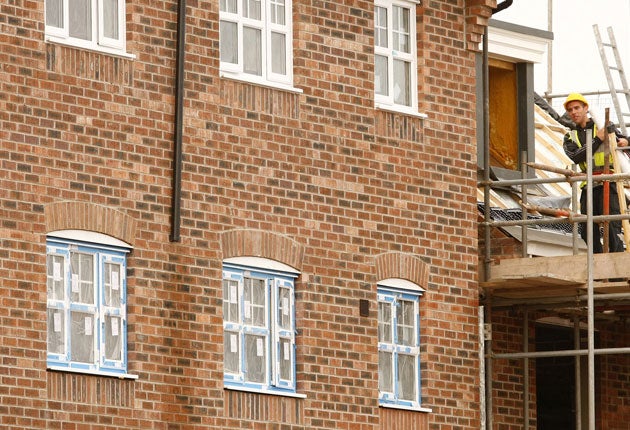Wayne Hemingway: Don't help the housebuilders – they're still making rubbish
Their business model has largely left us with poor housing

Your support helps us to tell the story
From reproductive rights to climate change to Big Tech, The Independent is on the ground when the story is developing. Whether it's investigating the financials of Elon Musk's pro-Trump PAC or producing our latest documentary, 'The A Word', which shines a light on the American women fighting for reproductive rights, we know how important it is to parse out the facts from the messaging.
At such a critical moment in US history, we need reporters on the ground. Your donation allows us to keep sending journalists to speak to both sides of the story.
The Independent is trusted by Americans across the entire political spectrum. And unlike many other quality news outlets, we choose not to lock Americans out of our reporting and analysis with paywalls. We believe quality journalism should be available to everyone, paid for by those who can afford it.
Your support makes all the difference.It is almost eight years since I wrote the infamous article for this newspaper entitled "Why I hate the creeping suburbs", which described the "Wimpeyfication" and "Barrattification" of Britain. It was a tirade against Britain's mass national housebuilders. I accused them of building the pastiche identikit rabbit hutches that were blighting the nation.
Right now the housing industry is on its backside with many sites "mothballed" and as a result the industry has shed its workforce at an unprecedented rate. It seems an ideal time for me to take stock and look at what I have learned since 2001. Where am I with this crusade to prove that housing can be well designed, part of a long-term, positive legacy leaving great places to live to the next generation, and both sustainable and profitable?
I still fear that there is a shortsighted and foolish political will to get the mass housebuilders building again and I believe that their business model has largely left us with poor housing, not fit for the purpose of living in it. What's more, I think it has contributed significantly to the existing economic woes. We should not be rushing to fix a broken housing industry no matter how severe the recession, no matter how short we are of housing stock. We need a new paradigm in housing delivery if we are to protect future generations from boom and bust just as importantly if we are going to stop delivering poor housing stock.
The housing industry has ridden along on a giant 15-year bubble. It was fuelled by greed, by stupidity and by mortgage lenders. Meanwhile, a complicit public couldn't do the maths – buying a "new build" house or flat has never outperformed cash investments over the long term. The bubble has thankfully burst now and while there is unfortunate short-term hurt I don't think that developers will be rushing to build poky "buy-to-let" or "buy-to-leave-empty" investment properties any more, mainly because the public are unlikely, in the short term, to be so foolish as to invest in them again.
The good news then is that the public and local authorities who have seen their towns and cities blighted by flatted developments that now lie empty are likely to demand something better. But while there may be a will from the consumer and some local authorities, I am not sure that central government agencies fully understand the seismic shift that is required if Britain is to start to deliver anything approaching the sustainable liveability that the government ministers rightly rave about after visiting Hammarby Sjostad, Freiburg, Western Harbour, Malmo and Ijburg.
Tick-box matrixes like "The Code for Sustainable Homes" will only solve carbon efficiency. They won't deliver places that lift the spirit and mature into buildings that are cherished centuries later.
It is often thrown back at champions of these European exemplars that "you can't compare these to the British system of delivery". Too right, but the British system is wrong and we must do everything we can to prevent the same system creeping back under the guise of "we have got to get the wheels turning, we have to get building homes again so let's shore up the mass housebuilders".
We do need homes built but they must be the right homes, in the right places, built to last by developers who have a conscience and realise the importance of their product and business model to the quality of life and the national economy. I for one don't want those same wheels turning again, because they have driven us up an ugly cul-de-sac. That major developers are being refinanced by banks at significantly higher interest rates on their borrowings can only mean one thing – more cost-cutting and a further denigration in quality.
For years, governments have played into the hands of developers who just wanted to maximise profits with no sensible, long-term strategy. Why, for example, did this Government's land-owning arm, English Partnerships, insist on selling strategic sites (with 500, 1,000, 1,500 homes on them) to one single developer? It may be simpler to manage, it may allow economies of scale, but the sale also allowed a "monopoly" over sites that flies in the face of one of the processes that allows the European exemplars to retain their quality – a simple process that can be brought in overnight – competition.
If the high street in all our towns was given over to a single retailer, we would have to endure something even worse than a street full of that not-so-sadly-missed purveyor of crappy pick'n'mix, Woolworths.
Since 2001 Wayne Hemingway has co-designed award-winning housing projects. He co-runs Hemingway Designs
Join our commenting forum
Join thought-provoking conversations, follow other Independent readers and see their replies
Comments